专四词汇专题讲座(word文档)
最新VOCABULARY lecture 英语专业 四级考试 tem4 词汇讲座ppt课件
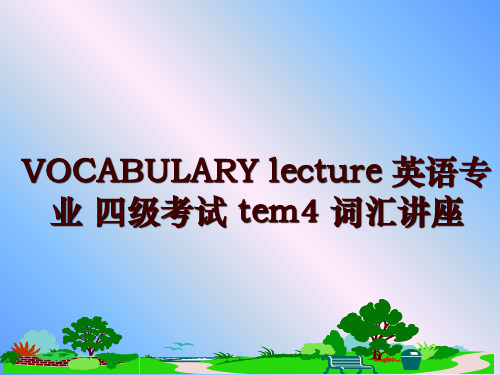
To finish or deal with (sth. Such as work) E.g. I’ve a pile of papers to get through before the meeting.
E.g. The crowd moved aside to let the firemen get by.
To continue to live, often in spite of difficulties ( I) (on, with) 度日
It’s getting on for midnight, let’s go to bed.
B. Get through
To pass through sth. such as a space e.g. The man was so fat that he couldn’t get through the door.
B. get away
To escape, esp from the scene of a crime, or from being caught逃脱 E.g. You should have seen the size of the fish that got away!
To leave, often with some difficulty离开 e.g. I’m sorry I’m late but the telephone rang just as I was about to leave, and I couldn’t get away.
To continue to live through ( difficult times) (T) e.g. I don’t know how poor people get through these cold winters.
英语专四词汇与语法部分讲解

目录
CONTENTS
Vocabulary section Syntactic component The combination of vocabulary and grammar Vocabulary and Grammar in the TEM-4 Exam Suggestions for improving vocabulary and grammar abilities Summary and Outlook
03
The combination of vocabulary and grammar
CHAPTER
Choosing and matching vocabulary is an important aspect of combining vocabulary and grammar in the English Proficiency Test Band 4.
Detailed description
The combination of vocabulary and grammar is the key to language use.
Summary
Detailed description
Candidates not only need to master a certain amount of English vocabulary, understand the fixed combinations and common phrases of vocabulary, but also need to master basic grammar knowledge and be able to choose the correct grammar form to construct sentences according to the context. At the same time, candidates also need to pay attention to the practical use of language and improve their language expression ability. In the English Proficiency Test Band 4, the examination of vocabulary and grammar is not limited to multiple-choice and fill in the blank questions, but also involves multiple aspects such as reading, writing, and translation. Therefore, candidates need to focus on accumulating vocabulary and grammar knowledge in their daily learning, engage in more reading, writing, and translation exercises, and improve their language proficiency.
(完整word版)英语专业四级词汇表(全)

pacific a。
和平的n。
太平洋pack vt。
捆扎;挤满n。
包package n.包裹,包,捆packet n。
小包(裹),小捆pad n。
垫;本子vt。
填塞page n.页pail n.桶,提桶pain n。
痛,痛苦悲伤;辛劳painful a.使痛的;费力的paint vt.画;油漆vi。
绘画painter n.漆工,画家,绘画者painting n。
油画;绘画;着色pair n.一对vi。
成对,配对palace n.宫,宫殿pale a.苍白的;浅的palm n.手掌,手心;掌状物pan n.平底锅,盘子panda n.小猫熊;猫熊pane n.窗格玻璃panel n。
专门小组;面,板pant n。
气喘;心跳paper n.纸;官方文件;文章parade n。
游行;检阅vi。
游行paradise n。
伊甸乐园;天堂paragraph n。
(文章的)段,节parallel a。
平行的;相同的parcel n.包裹,小包,邮包pardon n.原谅;赦免vt.原谅parent n.父亲,母亲,双亲park n。
公园;停车场parliament n.议会,国会part n。
一部分;零件;本份partial a。
部分的;不公平的partially ad.部分地participate vi.参与,参加;分享particle n.粒子,微粒particular a.特殊的;特定的particularly ad。
特别,尤其,格外partly ad。
部分地,不完全地partner n.伙伴;搭挡;配偶party n.党,党派;聚会pass vt。
经过;通过;度过passage n.通过;通路,通道passenger n。
乘客,旅客,过路人passion n.激情,热情;爱好passive a。
被动的;消极的passport n。
护照past a.过去的n.过去paste n。
糊,酱;浆湖pastime n。
专四词汇讲座(王苏雷)

解析TEM4
• achieve • 1 to successfully complete something or get a good result, especially by working hard: • Frances achieved very good exam results. • Wilson has achieved considerable success as an artist. • She eventually achieved her goal of becoming a professor.
解析TEM4
• attain • 1 to succeed in achieving something after trying for a long time: • More women are attaining positions of power. • 2 to reach a particular level, age, size etc: • Share prices attained a high of $3.27. • After a year she had attained her ideal weight. • —attainable adjective: • This target should be attainable.
单词记忆法
• 3. 近义词串联法 • innovate/renovate • evolve/ revolve/involve/resolve
单词记忆法
• 4. 联想记忆 • oman--o man --凶兆 • stationary(静止的l) ---stationery(文具)
艾宾浩斯是第一个对记忆进行系统定量研究 的科学家。艾宾浩斯曲线可以简述为: 记住一段材料之后经过的时间 材料保持量 20分钟 58% 1小时 44& 9小时 36% 1天 33% 2天 28& 6天 25% 31天 21%
专四语法词汇课件lecture 1
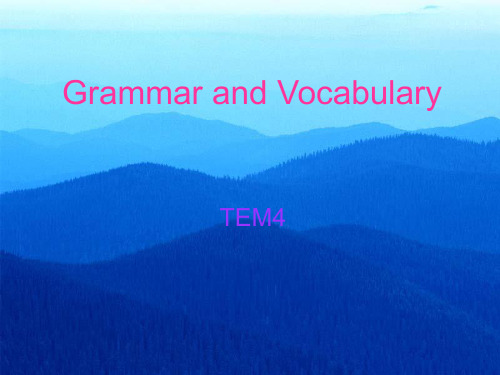
TEM4
语法常考点
一、虚拟语气
1. if, unless, otherwise引导的从句
表示虚拟的时间 条件从句的谓语形式 主句谓语形式
与现在相反
与过去相反
过去式(did)/be动词用were
过去完成式(had done)
would /should/might/could +do
3. Wish“希望” ,从句用一般过去时或过去完成时。
4. If only“要是…就好了”,从句用一般过去时或过去 完成时。
5. But for“要不是”,given…, provided…., providing (that)…, supposing (that)…,后接名词短 语或从句,表示条件,意为“如果”;主句用虚拟语 气。
C. has betrayed…took
D. has betrayed….take
B 2. If only I ______ play the guitar as well as you!
A. would B. could C. should D. might C 3. _______ enough time and money, the researchers would have been able to discover more in this field. A. Giving B. To given C. Given D. Being given
2. It is imperative/recommended that students A _______ their term papers on time.
A. hand in B. would hand in
专业四级语法词汇练习有真题讲解(DOC)

英语专业四级语法、词汇知识讲座1.《教学大纲》对英语专业语法的总体描述是:能识别词类;区分名词的可数性和不可数性,可数名词的单、复数形式;基本掌握各种代词的形式与用法、基数词和序数词、常用介词和连词、形容词和副词的句法功能、比较级和最高级的构成及基本句型、冠词的一般用法;了解动词的主要种类、时态、语态及不定式和分词的基本用法、句子种类、基本句型和基本构词法。
掌握主谓一致关系、表语从句、宾语从句、定语从句和状语从句等句型、直接引语和间接引语的用法、动词不定式和分词的用法、各种时态、主动语态、被动语态和构词法。
其中对四级的要求是:除掌握上述内容外,还应该熟练掌握主语从句、同位语从句、倒装句和各种条件句。
2.《教学大纲》对英语专业词汇的总体描述是:认知词汇不少于2,000个;掌握1,200个左右的常用词和一定数量的习惯用语及固定搭配,并能在口语中运用;认识740个左右的单词和一定数量的习惯用语及固定搭配,能根据上下文的提示理解其含义。
通过基础英语课、阅读课和其他途径认知词汇达4,000~5,000个(其中含中学已学的2,000个),正确而熟练地使用其中的2,000~2,500个及其最基本的搭配。
其中对四级的要求是:通过基础英语课、阅读课和其他途径认知词汇5,500 6,500个(含第二级要求的4,000~5,000个),正确而熟练地运用其中的3,000~4,000个及其最基本的搭配。
近年来专业四级考试中Grammar and Vocabulary部分中,50%为词汇、词组和短语的用法,约50%为语法结构。
该题在总分中虽占分不多,但作为测试考生英语水平之基础,它对于TEM4中所有题项影响之大是众所周知的,因为任何一门外语的学习均始于词汇和语法,且对于词汇数量及其深度的掌握程度在一定意义上反应一个人的英语水平。
因此,掌握词汇和语法对于在TEM4中取得好成绩显得尤为重要。
综观这近几年考题,可发现:1.语法考题的涉及面宽,近年考题曾经考到:几乎所有词类;三种动词的非谓语形式;各种从句及关系词的用法;动词时态、虚拟语气、情态动词的用法;独立主格,主谓一致,倒装,强调、并列结构等基本语法知识。
专四词汇讲解

YOUNG LAU
4
• .change : 指任何变化,完全改变,强调与 原先的情况有明显的不同。 • Flyovers have changed the face of the city. • (立交桥改变了城市的面貌。)
• alter 所表示的“改变”只是细节的,或外表的变化,并不表示本质的改 变。 • 如:把一件衣服改小一些或只把衣袖稍放肥一些,但衣服的式样仍然不变, • 它还可以表示改变计划,现状,生态,习惯,倾向,结果,历史进程,主 意等 • Can you alter this suit for me? • 你可以为我修改这套衣服吗? The contract does not alter the status quo. • 合同不能改变现状。 • Pollution can alter the ecology of an area. • 污染会改变一个地区的生态。
• • • • • • • • • 1. Attendance at evening prayers is not compulsory. 参加晚祷并非硬性规定。 2. Attendance at my lectures has fallen off considerably. 听我讲课的人已大大减少了。 3. Attendance at the concert was very poor. 那次音乐体上,小的接在大 的上面,活动的接在固定的上面。 associate指人与人友好和平、平等地联合 在一起;用于物时,指两事物因历史或其 它原因,很自然被人们联系在一起,即产 生联想。 relate指人与人有亲戚或婚烟关系;也指人 或物之间尚存的实际或假想的联系。
17
• Differ in; • be different in 在..不同
(完整word版)专四高频词汇与短语(免费可直接打印)
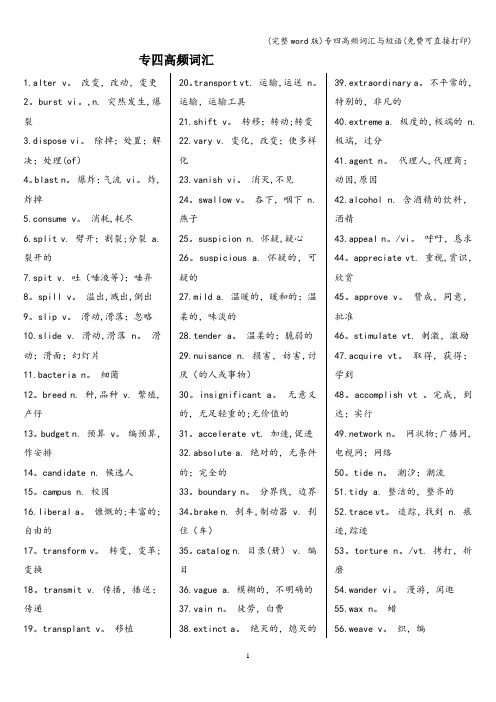
专四高频词汇1.alter v。
改变,改动,变更2。
burst vi。
,n. 突然发生,爆裂3.dispose vi。
除掉;处置;解决;处理(of)4。
blast n。
爆炸;气流 vi。
炸,炸掉5.consume v。
消耗,耗尽6.split v. 劈开;割裂;分裂 a.裂开的7.spit v. 吐(唾液等);唾弃8。
spill v。
溢出,溅出,倒出9。
slip v。
滑动,滑落;忽略10.slide v. 滑动,滑落 n。
滑动;滑面;幻灯片11.bacteria n。
细菌12。
breed n. 种,品种 v. 繁殖,产仔13。
budget n. 预算 v。
编预算,作安排14。
candidate n. 候选人15。
campus n. 校园16.liberal a。
慷慨的;丰富的;自由的17。
transform v。
转变,变革;变换18。
transmit v. 传播,播送;传递19。
transplant v。
移植20。
transport vt. 运输,运送 n。
运输,运输工具21.shift v。
转移;转动;转变22.vary v. 变化,改变;使多样化23.vanish vi。
消灭,不见24。
swallow v。
吞下,咽下 n.燕子25。
suspicion n. 怀疑,疑心26。
suspicious a. 怀疑的,可疑的d a. 温暖的,暖和的;温柔的,味淡的28.tender a。
温柔的;脆弱的29.nuisance n. 损害,妨害,讨厌(的人或事物)30。
insignificant a。
无意义的,无足轻重的;无价值的31。
accelerate vt. 加速,促进32.absolute a. 绝对的,无条件的;完全的33。
boundary n。
分界线,边界34。
brake n. 刹车,制动器 v. 刹住(车)35。
catalog n. 目录(册) v. 编目36.vague a. 模糊的,不明确的37.vain n。
英语专业四级讲座词汇2020
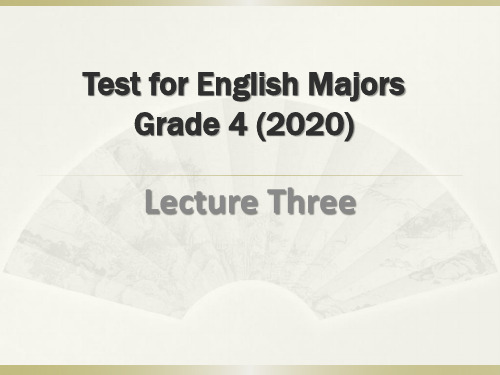
Display of Goods
Sweets are often placed at children’s eye level at the checkout. While parents are waiting to pay, children reach for the sweets and put them in the trolley.
give up〓普通用语,侧重指没有希望或因外界 压力而放弃。
ability, capacity, capability, genius, talent, competence, faculty, gift, aptitude
ability〓普通用词,指人先天的或学来的各 种能力。
capacity〓侧重指人的潜在能力,通常不指 体力,多指才智,尤指接受与领悟能力。
The United Nations
The second part is called the Security Council. It has representatives of just 15 nations. Five nations are permanent members: the United States, Russia, France, Britain, and China. The 10 other members are elected every two years by the General Assembly.
Test for English Majors Grade 4 (2020)
Lecture Three
Display of Goods
Are supermarkets designed to persuade us to buy more?
专四相关词汇讲解
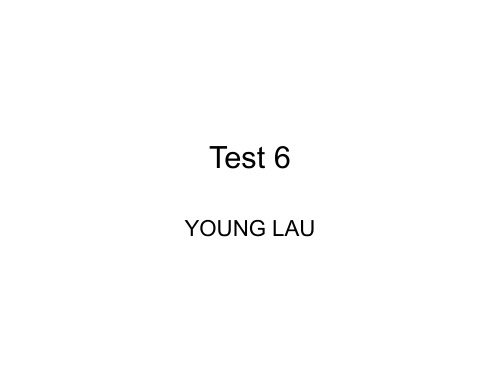
– English is now spoken in many countries other than England.
除英国外,其他许多国家都讲英语。
– There were three people at the meeting other than Mr Day.
除戴先生以外,还有三个人参加了会议。 • other than = besides “除……以外, 以外, 除 以外 还……”
• expand数量或重要性的扩大、增长、增强。
• 例如: • He breathed deeply and expanded his chest. • 他深深地吸了一口气而把胸部扩张起来了。
20
There is nobody here other than me.
•
这里除了我以外没有别人。
Someone other than your brother should be appointed manager. 应当任命一个除了你兄弟之外的人当经理。 other than = except, but, apart from “除……以外” 以外” 除 以外
– I borrowed some books other than novels.
我借了几本书,都不是小说书。 • other than = not, instead of, rather than “不、非、而不是” 而不是” 不
– You can’t get there other than by swimming.
8
• • • • • • 1. The scheme is partly financed by a government grant. 此计画有一部分是政府资助的。 2. The moon is partly eclipsed. 月偏食了。
专业四级辅导词汇讲义

专业四级辅导词汇讲义第一节概述历年词汇题共计212道。
测试重点为固定搭配短语,形容词和副词,动词及名词。
重点词汇大约848个,其中固定短语252个,形容词和副词236个,动词184个,名词176个。
关键:做好真题!!考题类型:短语搭配,异形异义,异形近义,近形异义,近形近义第二节短语搭配63道题,252个搭配(注意介词的特定含义)常用动词:get,take,put,entitle,hand,carry,come,draw,keep,stand,pa y,look,suppose,possess,throw,pull,bring,dispose,admit,intend,absor b,engross,involve,do,preside,catch,work,fall,fit,prefer,reduce,part,make。
(30 questions)常用介词:as,by,with,without,in,on,for,of,to,over,off (17 questi ons)专考:so,such (5 questions)其他:111.The old couple would never _____ the loss of their son. (2002)A. get overB. get awayC. get offD. get across2. My mother can’t get _____ because she has rheumatism. (2000)A. aboutB. onC. throughD. in3. Most people can’t get _____ the day wit hout at least one cup of tea of cof fee. (1995)A. onB. throughC. overD. by4. Half the excuses she gives are not true, but she always seems to _____ the m. (1996)A. get on withB. get away withC. get up fromD. get in on5. Isn’t i t time you _____ some serious work before the examination?A. got down toB. took up withC. got off withD. put down to6. As the drug took _____ the patient became quieter. (1995)A. forceB. effectC. actionD. influence7. I was very much put _____ by Mark’s rude behavior, it really annoyed me. (2000)A. overB. offC. upD. by8. The membership card entitled him _____ certain privileges in the club. (199 8)A. onB. inC. atD. to9. She refused to _____ the door key to the landlady until she got back her d eposit. (1999)A. hand inB. hand outC. hand downD. hand over10. If he _____ in that way for much longer he will find himself in the bank ruptcy court. (1996)A. carries onB. carries offC. carried byD. carried away11. Am I to understand that his new post _____ no responsibility with it at al l?A. keepsB. supportsC. carriesD. possesses12. Very few scientists _____ with completely new answers to the world’s pro blems. (1996)A. come toB. come roundC. come onD. come up13. The plans for the building were _____ a few months ago. (1993)A. drawn onB. drawn backC. drawn outD. drawn up14. Although the false bank-notes fooled many people, they did not _____ to close examination. (1996)A. look upB. pay upC. keep upD. stand up15. Because of his poor health, it took him a long time to throw _____ his b ad cold. (1995)A. offB. awayC. downD. over16. Mr. Brown’s condi tion looks very serious and it is doubtful if he will pull _____. (1995)A. upB. throughC. outD. back17. In the next few years major changes will be _____ in China’s industries. (1994)A. brought forwardB. brought aboutC. brought onD. brought up18. Please dispose _____ those old newspapers while you’re cleaning up the r oom. (1994)A. outB. ofC. awayD. in19. This question admits _____ several answers. (1992)A. forB. withC. ofD. to20. He was s o _____ on his work that he didn’t hear her come in. (1994)A. intentB. absorbedC. engrossedD. involved21. The Christmas presents were all _____ in shiny paper. (1994)A. done overB. done withC. done outD. done up22. Mr. Anderson presided _____ the board meeting on behalf of the Chairma n. (1993)A. atB. overC. onD. in23. The album might well have _____ had it been less expensive. (1993)A. worked outB. fallen throughC. caught onD. fitted in24. The children prefer camping in the mountains _____ an indoor activity. (1 998)A. toB. thanC. forD. with25. During the famine, many people were _____ to going without food for da ys. (2001)A. sunk D. reduced C. forced D. declined26. In order to raise money, Aunt Nicola had to _____ with some of her mos t treasured possessions. (2001)A. divideB. separateC. partD. abandon27. For the success of the project, the company should _____ the most of the opportunities at hand. (1998)A. obtainB. graspC. catchD. make28. As my exams are coming next week, I’ll take advantage of the weekend t o _____ on some reading. (2004)A. catch upB. clear upC. make upD. pick up29. He will have to _____ his indecent behaviour one day. (2003)A. answer toB. answer forC. answer backD. answer about30. Whenever possible, Ina ____ how well he speaks Japanese. (2003)A. shows upB. shows aroundC. shows offD. shows out1.You needn’t wor ry _____ regards the cost of the operation. (2001)A. withB. whichC. asD. about2. I only know the man by _____ but I have never spoken to him. (2001)A. chanceB. heartC. sightD. experience3. His expenditure on holidays and luxuries is rather high in _____ to his inc ome. (2001)A. comparisonB. proportionC. associationD. calculation4. You must let me have the annual report without _____ by ten o’clock tom orrow morning. (2000)A. failureB. hesitationC. troubleD. fail5. As the director can’t come to the reception, I’m representing the company _ ____. (2000)A. on his accountB. on his behalfC. for his partD. in his in terest6. The fact that the management is trying to reach agreement _____ five separ ate unions has led to long negotiations. (1999)A. overB. uponC. inD. with7. The office has to be shut down _____ funds. (1996)A. being a lack ofB. from back ofC. to a lack ofD. for lac k of8. She may be _____ experience, but she learns quickly. (1993)A. lackingB. lacking inC. in need forD. in lack of9. The ticket taker at the football game tore the tickets _____. (1993)A. in halfB. by halfC. in halvesD. at half10. _____ all probability nobody would have complained if Mary had not told the neighbours about it. (1992)A. ToB. InC. ForD. At11. The police let him go, because they didn’t find him guilty _____ the mur der. (1999)A. ofB. inC. overD. on12. The guest team was beaten by the host team 2 _____ 4 in last year’s CFA Cup Final. (1999)A. overB. inC. toD. against13. They had a pleasant chat _____ a cup of coffee. (1995)run: yes"> C. during D. over14. A ship with a heavy load of timber is reported to have sunk _____ the c oast of California. (1994)A. offB. onC. atD. in15. Issues of price, place, promotion, and product are _____ conventional conc erns in planning marketing strategies. (2004)A. these of the mostB. most of thoseC. among the mostD. a mong the many of16. He plays tennis to the _____ of all other sports. (2004)A. eradicationB. exclusionC. extensionD. inclusion17. At three thousands fee, wide plains begin to appear and there is never a moment when some distant mountain is not _____. (2003)A. on viewB. at a glanceC. on the sceneD. in sightget on get about get across get ahead get along get along with get atget away get away with get back at get by get down to get in get i nto get offget on get on to get out get round get togethertake after take apart take away take down take in take off take on t ake outtake over take to take upput across put aside put away put down put forward put in put off put on put output through put up put up withentitlehand down hand in hand on hand out hand overcarry away carry off carry on carry out carry throughcome about come along come across come at come before come by come down oncome into come off come on come out come round come round to come throughcome to come up come up against come up to come up withdraw aside draw back draw in draw into draw on draw out draw upkeep at keep back keep down keep off keep to keep upstand by stand for stand out stand up for stand up topay back pay for pay off pay out pay uplook at look back look back on look down on look in look into lo ok on look overlook round look through look to look up look up tosupposesubject topossessthrow off throw up throw awaypull down pull in pull off pull out pull through put upbring about bring back bring down bring forward bring out bring r oundbring through bring together bring updisposeadmit of admit tointend toabsord inengrossinvolve indo away with do down do for do with do without do uppresidecatch at catch on catch up withwork out work upfall in fall to fall back on fall behind fall for fall in with fall int o fall off fall out fall through fall tofitprefer toreducepartmake away with make for make of make off make out make up m ake up formake up to make wayas a rule as best one can as concerns as follows as for as to as rega rdsby accident by air by all means by all nerves by and by by and larg e by chanceby far by heart by means of by mistake by night by request by turnsby virtue of by way ofwith regard to with respect to with the view ofin a sense in accordance with in all in any case(event) in charge of in c ommon in comparison with in consequence in debt to sb indetail in di fficulties in effectin face of in faith in force in full in half in light of in line (with) i n no casein no time in one’s honour in part in particular in person in place in proportion toin public in question in regard to in return in season in session in short in sightin step in terms of in the end in the heat of in the least in the long r un in the name of in the negative in the way in turn in vain in vie w of in useon a large scale on account of on an average on balance on behalf of on businesson condition that on credit on display on duty on earth on end on fire on no accounton occasion on one’s own on principle on purpose on relief on sale on the nailon second thoughts on the contrary on the grounds of on the lips of on the run on the side on the spot on the table on the turn on viewfor ages for good for life for sale for sure for the best for the better for the futurefor the time beingof one’s own of itselfto a day to date to say nothing of to some extent to the contrary to the life to the limitto the number of to the pointoveroff and on off balance off dutyso much so that其他固定搭配1.I can’t go --- for one thing, I have no money, and _____, I have too much work.A. what’s moreB. as wellC. for anotherD. in addition2._____ him tomorrow?A. Why not to call onB. Why don’t call onC. Why not cal ling onD. Why not call on3.He was _____ to tell the truth even to his closest friend. (2001)A. too much of a cowardB. too much the cowardC. a coward enoughD. enough of a coward4.He’s _____ as a “bellyacher”---he’s always comp laining about something.(1999)A. who is knownB. whom is knownC. what is knownD. which is known5.I felt that I was not yet ____ to travel abroad. (1997)A. too strongB. strong enoughC. so strongD. enough strong6.You’d better look at the difficulty _____. (1995)A. the other wayB. by the other wayC. another wayD. by anothe r way7.She has taken great pains to conceal her emotions, and thereby made them_____ conspicuous. (1994)A. all the moreB. all the muchC. all moreD. all much8.She said she would work it out herself _____ ask me for help. (1993)A. and not toB. but notC. and prefer notD. rather than9._____, he is ready to accept suggestions from different sources. (1997)A. Instead of his contributionsB. For all his notable contributionsC. His making notable contributionsD. However his notable contributions10.______ your timely advice, I would never have known how to go about the work.A. UnlessB. But forC. Except forD. Not for第三节动词动词词义辨析是词汇考试的重点. 每年平均考题为3.54道. 以往考试中动词词义辨析试题总计46题, 约184个常用单词.Involve include combine containResult assure entail accomplishObtain improve benefit continueChallenge obstructed resist struggleAssemble ariserise resultConfess declare claim confirmUse apply try practiceAssign tackle realize solveFrustrate prevent discourage accomplishPreside introduce chair dominateSwerve twist depart swingVisit travel watch tourExchange transfer convey convertEngage devote seek pursueOriginate stem derive descendPause halt repel keepResign surrender release abandon Ensure examine verify testify Force press provide poseRefrain prevent resist restrainAvoid prohibit reject repell Change adapt modify confirm Depart abandon vacate displace Inform notify instruct acquaint Reject deny withheld depriveFaint pale bleach fadeShrink shorten contract condense Punch slap knock whipRinse wipe sweep scrubAppeal claim beg pleadTurn change float fluctuate Discover uncover tell disclose Dismiss discharge expel resignReduce refresh release recover Disfavour dispel disqualify dismiss Acknowledge afford allow account Spin shiver shake staggerArouse arise raise riseSkate skid slid slipSpread separate splash scatter Recover renew restore replace Discard dispel dispose discharge Drain drop spill dripRecover restore renew revive第四节副词,形容词词义辨析平均每年测试4.54. 试题总计59道, 约236个常用词异形异义relevant simultaneous consistent practical restless skill strong versatiledistant slim unlikely narrowconsistently consequently invariably fortunately exploit controversial inexhaustible remarkable uninformative startling harmless uncontrollable promising agreeing pleasing obligingindicative positive revealing evidentconcerning dependent connecting relevant similar singular different separateprofound productive prosperous plentiful thereof thereby thereabouts thereafter异形近义load crowd fill squeezeonly quite narrowly seldomnormal average usual generalaverage common usual normalempty vacant free desertempty blank desert vacantnearly hardly merely barelyeconomic thrifty frugal carefuleconomic miserly disgusted playfulurgent instant prompt hastyviolently severely extremely radicallyeternal infinite ceaseless everlastingnumerous vast most massivequiet silent mute speechlessstale smoke misty wetproficient outstanding prominent experiencedabsorbed attentive consumed intentbase prime raw roughrare unusual extraordinary uniqueinvaluable priceless unworthy worthlessadapted equipped suited fittedvibrant violent energetic full形似异义substantial spontaneous simultaneous synthetic regretful regrettable regretting regrettedconfidentially proudly assuredly confidently subsequently successively predominantly preliminarily respectable respectful respective respecting considered considerate considerable considering honest honored honorary honorificsensible sensitive tough reasonableinsensitive allergic sensible infectedimagining imaginative imaginable imaginary neglectful negligible neglected negligentunjustified unjust misguided unacceptedlatter latest later lastfavoured favourable favourite favouringeloquent effective emotional emphatic形似近义special peculiar particular specificexceedingly excessively extensively exclusively worthless invaluable unworthy priceless insistent persistent consistent resistant intermediate middle medium mid第五节名词词义辨析平均3.38道, 共计44道题, 约176个常用名词.异形异义air mood area climatetrouble obscurity ignorance misgivings practice intention state occasionreaction comment impression comprehension limit loss poverty scarcity异形近义award compensation prize rewardapplication bid proposal suggestionpieces essays fragments extractsdifference distinction comparison division separation division distinction difference order form state circumstanceorigin generation descent causeway track road lanepreparation requirement specification provision move step speed paceaffair luck event chanceremark warning notice attentionannoyance offence resentment irritation intention interest wish desireblank space pause waiteffort strength attempt forceaccess entrance way pathlandlord tenant client proprietor nuisance disturbance trouble annoyance vision idea imagination illusionwork career post employment proficiency capability strength capacity spot mark stain patchways possibility plan meanshint mention clue commentquery hint thought cluejunk litter scrap depositcommemorate memorise remember remind hold grip grasp seizurebarn stable kennel shedcapacity opening range scopesign mark signal boardsheets scrap page slicedisgust curse grudge hatredoutline reference frame outlookfurniture furnitures possession possessionsdisapproval distaste dissatisfaction dismay glance glimpse glare gleamword。
专四词汇精讲讲义曲根

2012年专四真题词汇精讲1.shrewd[?ru?d]a.精明的shrewdnessn.精明&同义词:astute[?'stju?t]canny['k?n?]2.thrifty['θr?ft?]a.节俭的thriftn.节俭&thrive[θra?v]v.繁荣,茂盛&同义词:economical[i?k?'n?m?k(?)l;ek-]frugal['fru?g(?)l]3.extravagant?k'str?v?g(?)nt;ek-]a.奢侈的,浪费的&extra-:前缀,表特别,非常&同义词:luxurious[l?g'???r??s;l?g'zj??-;l?k'sj??-]奢侈的4.vary['ve?r?]v.使变化variousa.多种多样的&同义词:convert[k?n'v??t]v.多强调状态的改变alter['??lt?;'?l-]v.多强调尺寸上的修改modify['m?d?fa?]v.改变;修饰transform[tr?ns'f??m]v.多强调好的变化5.embrace?m'bre?s;em-]v.包括;拥抱&brace:与手有关bracelet['bre?sl?t]n.手镯6.headquarters[hed'kw??t?z]n.总部branch[brɑ?n(t)?]n.分公司subsidiary[s?b's?d??r?]n.子公司7.fraud[fr??d]n.欺骗defraud[d?'fr??d]v.欺骗fraudulent['fr??dj?l(?)nt]a.欺骗性的unch[l??nt?]vt.发出;发布launcharocket发射火箭,launchanewproduct发布新产品launchacomprehensivestudyofthemarket发布针对市场的全面报告9.retrieve[r?'tri?v]vt.找回;恢复&re-:回来retract[r?'tr?kt]v.缩回;取消&track:拉attract[?'tr?kt]v.吸引distract[d?'str?kt]v.分散(注意力),分心extract[?k'str?kt;ek-]v.取出,拔出extractyourteeth拔牙Thisarticleisextractedfromthenovel.这篇文章是从小说里摘录的。
英语词汇专题讲座

Spir 气
Aspire 一口气 Inspire 注入一口气 Expire 呼出气 Respire 反复呼气 Conspire共同呼吸
利用词缀模糊记忆单词 dis=apart
Байду номын сангаас
Dissolve(溶解) dissipate(消散) disseminate(散布) dismiss(遣 散) Disperse(消散,分散) dismantle(拆开)dispense(分 发)discrete(分离的) Distribute(分配)
Pseudo---false Pseudoscience pseudopregnant pseudoname Re---again, back Recall rebuild Semi---half Semiconductor semiofficial semiannual Sub---under(suc,suf,sug,sum,sup,sur,sus) Subconscious subtitle subway Super---above,over Superb supersonic superpower
Bio---life Biochemistry biology Centi---hundred Centigrade centimeter Co=col=com=con=cor---together Cooperate coexistence colleague collect Companion concentrate correlate corrupt Contra=counter---against Contrary contrast counterbalance counterattack
- 1、下载文档前请自行甄别文档内容的完整性,平台不提供额外的编辑、内容补充、找答案等附加服务。
- 2、"仅部分预览"的文档,不可在线预览部分如存在完整性等问题,可反馈申请退款(可完整预览的文档不适用该条件!)。
- 3、如文档侵犯您的权益,请联系客服反馈,我们会尽快为您处理(人工客服工作时间:9:00-18:30)。
专四词汇专题讲座如何突破考试前的“高原期”•或许我们都有这样的体验,考试前复习功课到一定程度后,尤其是复习一两遍之后,便会产生一种莫名的厌倦情绪,不想再看复习材料了。
想一想,又觉得自己还有许多地方复习不到家,但是又腻烦得很;精神困倦,可想睡又睡不着;注意力分散,读了几行字竟不知其什么意思,还要从头再读……•一、要设法使自己的头脑冷静下来,不要着急。
要明白“高原期”是下一个飞跃的前奏。
这个停顿是必然要出现的。
不经过这个阶段,就不会到达巅峰。
•二、把自己要复习的功课总结、对比一下,根据教学和考试大纲的要求去寻找差距。
•三、认真对待各种测验和模拟考试。
•四、一切杂事尽快办完,即使办不完的,也最好放下来,集中精力抓复习。
我奉劝大家不要老是在找所谓的“捷径”,踏踏实实的走好每一步才是王道。
• Know the enemy and know yourself, and you can fight a hundred battles without defeat.----知彼知己,百战不殆•专四词汇知多少?•专四词汇考什么?•词汇怎么来扩大?•专四词汇难点与考点解析专四词汇知多少?专四词汇知多少???•How many words are there in English?•Two separate studies (Dupuy, 1974; Goulden, Nation and Read, 1990) have looked at the vocabulary of Webster's Third International Dictionary (1963), the largest non-historical dictionary of English when it was published. When compound words, archaic words, abbreviations, proper names, alternative spellings and dialect forms are excluded, and when words are classified into word families consisting of a base word, inflected forms, and transparent derivations, Webster's 3rd has a vocabulary of around 54,000word families. This is a learning goal far beyond the reaches of second language learners and, as we shall see, most native speakers.•At present the best conservative rule of thumb that we have is that up to a vocabulary size of around 20,000 word families, we should expect that native speakers will add roughly 1000 word families a year to their vocabulary size. That means that a five year old beginning school will have a vocabulary of around 4000 to 5000 word families. A university graduate will have a vocabulary of around 20,000 word families (Goulden, Nation and Read, 1990). These figures are very rough and there is likely to be very large variation between individuals. These figures exclude proper names, compound words, abbreviations, and foreign words. A word family is taken to include a base word, its inflected forms, and a small number of reasonably regular derived forms (Bauer and Nation, 1993).• Clearly the learner needs to know the 3,000 or so highfrequency words of the language. These are an immediate high priority and there is little sense in focusing on other vocabulary until these are well learned.• Nation (1990) argues that after these high frequency words are learned, the next focus for the teacher is on helping the learners develop strategies to comprehend and learn the low frequency words of the language.•请问专四考试要求的词汇量是多少?与大学英语六级相比,哪个考试词汇量要求更大?•高等学校英语专业教学大纲规定专四水平学生应认知词汇5,500~6,500个,正确而熟练地运用其中的3,000~4,000个及其最基本的搭配。
而考生们比较熟悉的大学英语六级考试要求5,500个单词。
•从考纲规定来说,专四的词汇量比六级更大,而且专四对词汇搭配、词义辨析考查得更加细化和专业;由于新六级考试已经取消了词汇语法题,因此在词汇用法的掌握方面要求明显低于专四。
•这里面尤其要注意,专四毕竟跟非英语专业的英语基础水平测试题目有不同,他要考察的是英语专业学生的技能,所以常常会对一些高难度的词法和语法点有所涉及。
所以也要学会记住各个考点所涉及的难点和例外情况(词法和语法的一个特色在于他们经常会有例外)。
•有些内容是需要强硬记住的,他们常常不符合任何规则,是一种惯例,这就是语言的特色,很多东西是约定俗成的,没有什么理由可以推敲,对付他们最好的办法就是见到一个记牢一个,这在专四考试里也屡见不鲜,要特别留意。
专四词汇考什么?•语法与词汇部分,考试时间是15分钟。
测试形式采用多项选择题,从2005年开始,本部分为30道题,每题有4个选项:题目中大约50%为词汇词组和短语用法题,50%为语法结构题。
分数比例:每题0.5分,共15分。
辨析固定搭配根据逻辑关系作出判断词汇怎么来扩大?•怎么办?怎么扩大词汇量?•Betty advised me to label our luggage carefully in case is gets _____ in transit.• A. misused B. mishandled C. mistaken D. mislaid•I must have mistaken your meaning/what you meant.•Don‟t mistake me, I mean what I say.•( get a wrong idea about sb/sth)•She is often mistaken for her twin sister.•(Wrongly suppose that sb/sth is sb/sth else)前缀记忆法•前缀(prefix),就是附加在词根前面的部分,具有一定的含义,通常改变词的意义而不改变词类。
前缀prefix这个词本身就是由前缀pre- (前)加词根fix(固定,缀)构成的。
前缀在构词中的地位和作用仅次于词根。
同一前缀pre-可以在许多不同的词中出现。
•monogamy•monolingual•monoxide•monologue•monoplane•monomolecular•monotonous建立词与词之间的关联记忆• Heavy Rain 大雨• Heavy Rain Icy 大冰雨• Heavy Snow 大雪• Heavy T-Storm 强烈雷雨• Isolated T-Storms 局部雷雨• Light Drizzle 微雨• Light Rain小雨• Light Rain Shower 小阵雨• Light Rain with Thunder 小雨有雷声• Light Snow 小雪• Light Snow Grains 小粒雪• Light Snow Shower 小阵雪• Lightening 雷电• Mist 薄雾• Rain Shower 阵雨• Scattered Showers 零星阵雨• Scattered Snow Showers 零星阵雪• Scattered Strong Storms 零星强烈暴风雨• Scattered T-Storms 零星雷雨• Showers 阵雨• Showers Early 早有阵雨• Showers Late 晚有阵雨• Showers in the Vicinity(邻近)周围有阵雨• Snow / Rain Icy Mix 冰雨夹雪• Snow and Fog 雾夹雪• Snow Shower 阵雪• Snowflakes 雪花• Sunny 阳光• Thunder 雷鸣• Thunder in the Vicinity 周围有雷雨• T-Storms Early 早有持续雷雨• T-Storms Late 晚有持续雷雨• Windy 有风• Windy Rain 刮风下雨• Wintry Mix 雨雪混合通过阅读来扩大词汇量•To read well, you need a strong vocabulary. To build a strong vocabulary, you need to read well.•Nation & Waring (1997)的调查结果显示:在阅读中通过语境学习词汇,是外语学习者词汇量增加的主要手段。
